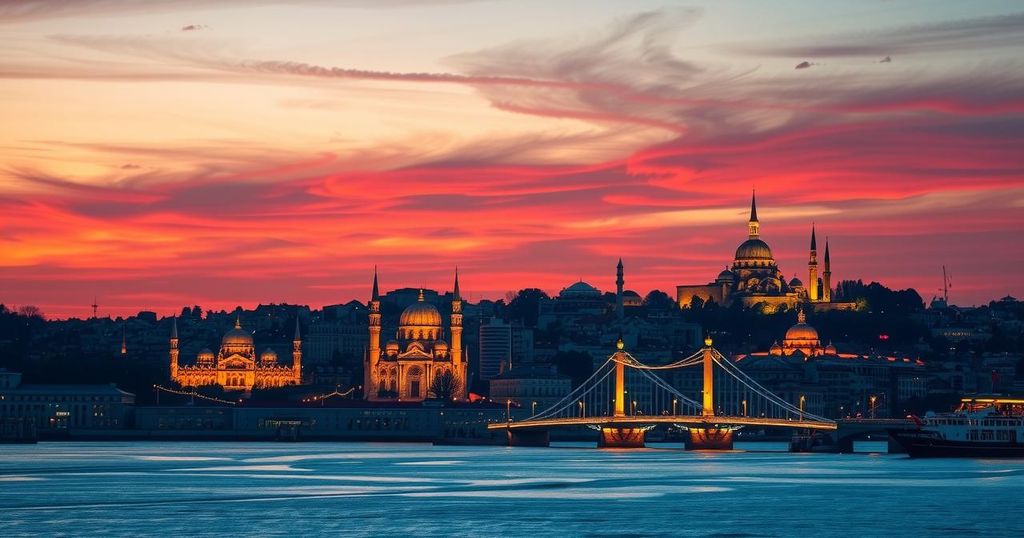Russia and Ukraine Prepare for Peace Talks in Turkey Amid High Tensions

Ukraine and Russia are set to meet in Turkey for peace talks, with President Zelensky insisting on a meeting with President Putin. Current tensions and conflicting demands complicate prospects for success. Speculation surrounds the possible attendance of US President Trump. Observers remain doubtful about an agreement, recalling the previous breakdown of talks three years ago.
Tensions remain high as Ukraine and Russia prepare for peace negotiations in Turkey. Ukrainian President Volodymyr Zelensky has expressed his willingness to meet face-to-face with Russian President Vladimir Putin in Istanbul. He made it abundantly clear that he would not engage in talks with lower-level officials from Russia, underscoring the importance of direct dialogue with the Kremlin’s leader.
Scheduled for Thursday, this meeting marks a significant moment in the peace process, occurring three years after earlier talks in Turkey fell apart. Speculation has arisen about US President Donald Trump potentially attending as he said he saw a “good meeting” on the horizon. It is yet to be confirmed, however, if Putin will join this round of discussions, thereby raising questions about the future of the negotiations.
While Russia acknowledged it would attend the talks, they rejected Ukraine’s calls for an unconditional 30-day ceasefire. The Kremlin maintains that its extensive demands, including nearly dismantling Ukraine’s sovereignty, have not been adequately addressed. Their position has led many observers to doubt whether any real progress will materialize from the upcoming discussions.
Zelensky’s strong support for US President Trump’s involvement highlights the complexities of international relations surrounding the conflict. Notably, both leaders have not met since 2019 during the Normandy Format summit in Paris. Zelensky tweeted, “I hope that the Russians will not avoid this meeting,” emphasizing the need for strong leadership in resolving this protracted conflict.
Kremlin spokesperson Dmitry Peskov remained vague about who from Russia might attend the talks. He assured that Russia is determined to explore avenues for achieving a long-term peaceful resolution but did not provide specifics about potential attendees.
Also, considering recent statements made by Putin about seeking peace, Zelensky’s aides have clarified that if Putin fails to show up, negotiations with lesser officials will not proceed. “If Vladimir Putin refuses to come to Turkey, it will be the final signal that Russia does not want to end this war,” said Andriy Yermak, Zelensky’s chief of staff. This stance underlines the critical nature of a face-to-face meeting with the Russian president.
Despite previous attempts for negotiations — which included separate talks with the Trump administration in Saudi Arabia — no notable agreements have surfaced. Current talks witnessed the participation of foreign ministers from both sides, but a significant divide persists.
Doubts about the effectiveness of these discussions remain, with analysts stating the terms set by Russia would compromise Ukraine’s sovereignty significantly. Ukraine’s allies in the West are advocating for substantial concessions from Russia before any fruitful negotiations can begin, further complicating the already complex situation.
In brief, few seem optimistic about the potential for a breakthrough. The last significant peace talks hosted by Turkey way back in March 2022 resulted in a deadlock, leaving many to wonder if this new round will end differently. Reports suggest that Russia also declined to renew a previous deal aimed at enabling Ukrainian grain shipments through the Black Sea, hinting at further estrangement in diplomatic relations. With the stakes for both nations exceptionally high, the upcoming talks will be closely watched.
In conclusion, the upcoming peace talks in Turkey between Ukraine and Russia are significant, marked by high tensions and strong leadership stakes. President Zelensky insists on direct dialogue with Putin, dismissing lower-level discussions. However, skepticism remains about the talks’ chances for success given the entrenched positions of both parties. Whether this meeting can lead to a meaningful resolution amidst global scrutiny is uncertain, making the outcome crucial for both nations and international observers alike.
Original Source: www.independent.co.uk








